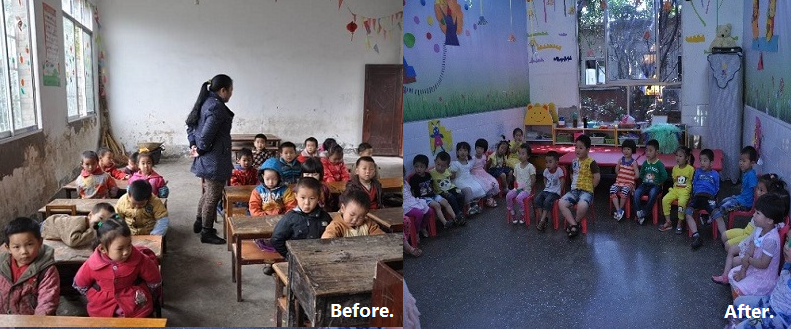By Margo O'Sullivan, PhD, Chief of Education and Child Development, UNICEF China.
What are your 'big' memories in life to date? If you are a parent, you may well share two of mine – the first day of my son's and daughter's attendance at primary school. They were days involving a whirlpool of emotions – love, anticipation, joy, pride, nervousness, sadness, stress, fear. I asked myself, on each of both first school days, as many parents do all over the world – will my child be able to manage school? Had I done enough to make sure my child was ready for school? The parental guilt trip!
For new parents in China, fortunately, the Ministry of Education has freely available resources that I, as a mother and an educator, wish I had available to me eight years ago when my children started school.
Reading these resources may shatter some deeply entrenched beliefs, however. Many parents believe your child is only ready for school if s/he can count, or know characters or alphabet, and that the best early childhood development (ECD) centre is one that uses formal school learning approaches to prepare your child for ‘big' school.
So this month, as we celebrate the fifth annual ECD advocacy month (Click here to visit UNICEF's ECD special page in Chinese) in China, let me convince you to change this thinking and instead join a movement that defines school readiness, the theme of this year's ECD month's celebration, to empower children with confidence, social and emotional skills love for and interest in learning, ready to start primary school. And leave the counting, and learning characters, until when they start grade one.
What is school readiness? Why is it so important? So let me start with the evidence.
In 2012, UNICEF's Global Chief of ECD, and internationally renowned expert on early childhood development, Professor Pia Britto, produced a conceptual framework on school readiness. Globally, she pointed out, school readiness involves: getting children ready for school, schools ready for children, and parents ready to support their children.
So how do I know if my child is ready for school? You can use the excellent Ministry of Education's 2012 National Early Learning Development Guidelines (For Chinese version click here) which presents the skills and knowledge in five domains that your child needs to develop before s/he goes to school (in Chinese).
The five domains, subdivided into content areas, include: health, language and early literature, sciences and pre-mathematics, social and emotional learning, and arts (expression, creativity, perception). The guidelines provide benchmarks for each domain for 3-4, 4-5 and 5-6 year olds and provides suggested activities, for ECD teachers and/or parents, to support children to reach these.
For example, for language skills, benchmarks focus on developing children's oral vocabulary and suggestions highlight that you speak to your child a lot, play speaking and listening games with them, read to your child, look at books together. This develops your child's vocabulary and interest in reading, key foundations for learning to read. If a child doesn't know a word or phrase how can s/he ever read it with understanding?
Of particular importance are activities that develop positive attitudes and approaches to learning, and those that enable social and emotional development, such as sustained attention, following directions, task persistence, creativity, initiative, curiosity, problem solving emotional regulation, and social relationships. These are also critical skills for children to navigate the 21stCentury. Also important globally, and included in the ELDGs, are moral development and national pride (Kagan and Britto, 2007).
Another useful resource for parents to support school readiness is Ministry of Education's and UNICEF's parenting portal. It includes 269 ECD messages and 200 micro-videos covering critical issues of early childhood development from birth to age 6 years.
Globally, children who start school with these strong foundational skills have been proven to catch up very quickly with the children who enter school able to ‘read and write' and ‘count', and within the first year of school will already surpass these children and perform better throughout school and as adults (Scheimwerth et al, 2004; Rose et al, 2005; Britto, 2012).
School readiness also depends on your child attending an ECD centre that uses national ELDGs. See the pictures below of before and after implementation of ELDGs in Song county in Sichuan Province. In the first school before teachers were trained on ELDGs, children spent all day repeating and memorizing, often without understanding. After UNICEF worked with MoE to train the teachers, the difference was astounding. Which experience would you want for your child?
 ©UNICEF/China ©UNICEF/China
School readiness is key and the theme for China's annual ECD advocacy month in 2016/2017. Are you ready to support your child's readiness for school?
|
Beyond the early childhood development centre, there are things that we as parents can do to help school readiness. Read to your child. Reading is key to developing children's vocabulary, their imagination, love of books and interest in reading, and creates a special bond with parents. Stories also contain messages and life lessons that help children navigate the world in which we live.
So as we celebrate this year's early childhood development month in China, I urge you to join us. Help us build a movement that helps equip every children to navigate school and build a long life love of learning.
Spread the message. Read to your child and encourage others to do the same.





























